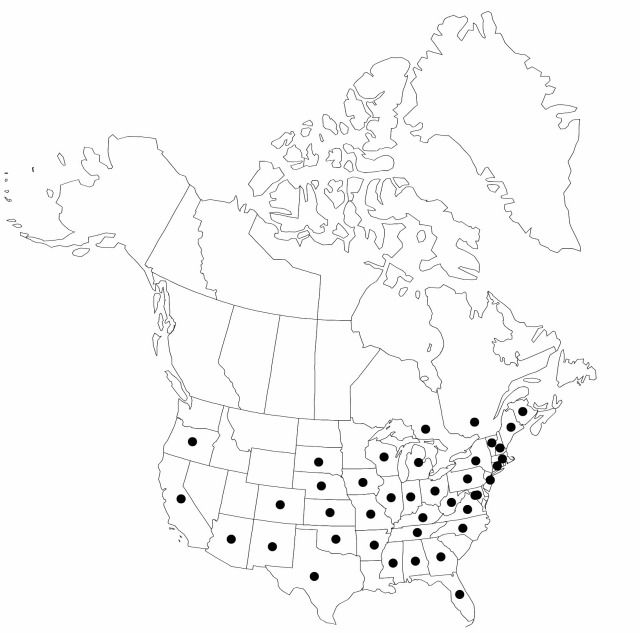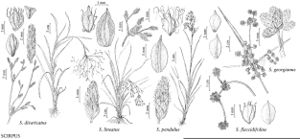Difference between revisions of "Scirpus pendulus"
Cat. Pl. Amer. Sept., 7. 1813.
FNA>Volume Importer |
FNA>Volume Importer |
(No difference)
| |
Revision as of 19:08, 24 September 2019
Plants cespitose; rhizomes short, stout. Culms: fertile ones upright or nearly so; nodes without axillary bulblets. Leaves 5–7 per culm; sheaths of proximal leaves whitish; proximal sheaths and blades with septa few, inconspicuous; blades 15–40 cm × 4–8(–12) mm. Inflorescences terminal only or sometimes also with 1(–2) lateral inflorescences from distal leaf axils; rays ascending or weakly divergent, rays and pedicels scabrous near nodes, otherwise smooth, rays without axillary bulblets; bases of involucral bracts green or speckled with red-brown, not glutinous. Spikelets in open cymes, central spikelet of each cyme sessile, others long-pedicellate, spikelets ovoid to lance-ovoid or subcylindric, 5–10(–12) × 2–3 mm; scales brown to red-brown with green midribs, ovate, 2 mm, apex mucronate, mucro 0.1–0.3 mm. Flowers: perianth bristles persistent or brittle and breaking off near base, 6, slender, strongly contorted, much longer than achene and often projecting far beyond it despite being strongly contorted, smooth, enclosed within scales or scarcely projecting beyond them; styles 3-fid. Achenes pale to medium brown, elliptic in outline, plano-convex or plumply trigonous, 1–1.2 × 0.6–0.8 mm. 2n = 40.
Phenology: Fruiting late spring–early summer (Jun–Jul).
Habitat: Marshes, moist meadows, ditches, often associated with calcareous substrates
Elevation: 0–600 m
Distribution

N.B., Ont., Que., Ala., Ariz., Ark., Calif., Colo., Conn., D.C., Fla., Ga., Ill., Ind., Iowa, Kans., Ky., Maine, Md., Mass., Mich., Miss., Mo., Nebr., N.H., N.J., N.Mex., N.Y., N.C., Ohio, Okla., Oreg., Pa., S.Dak., Tenn., Tex., Vt., Va., W.Va., Wis., Mexico (Coahuila), Australia.
Discussion
Prior to 1966, the name Scirpus lineatus was incorrectly used for S. pendulus (A. E. Schuyler 1966). A nineteenth century Buckley collection from “Valley of the Lower Rio Grande,” may reflect an introduced population that has not persisted.
Selected References
None.
